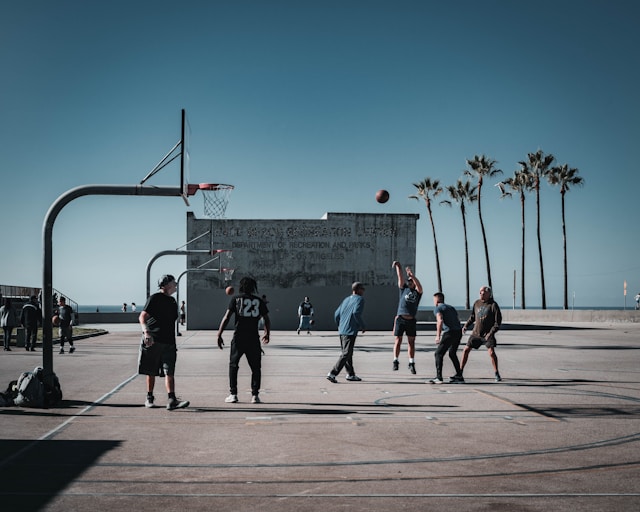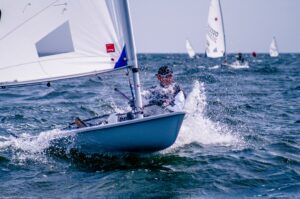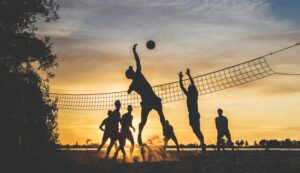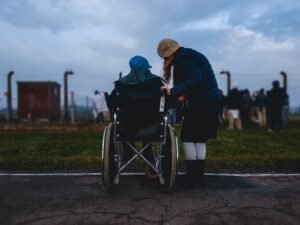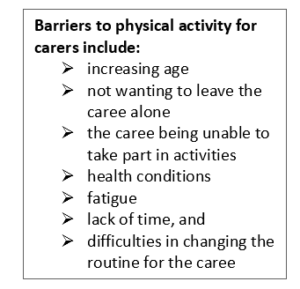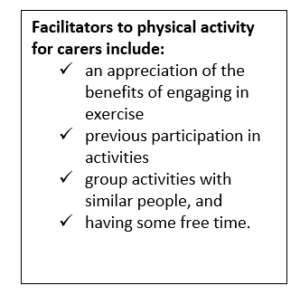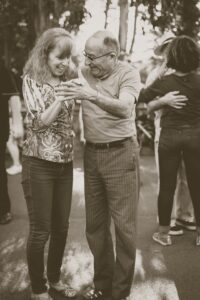By Dr Helen Owton
Learn about Nottingham Forest Netball and their rise to success in this article.
Find out more about The Open University’s Sport and Fitness courses and qualifications.
The ‘coolification’ of women’s sport has transformed it from a niche pastime to a mainstream attraction, with fans flocking to support women’s teams across the globe (Maurice, 2024 ). In Australia, netball is one of the most popular women’s sports, boasting over 1 million players nationwide and a robust grassroots network . The Suncorp Super Netball (SSN) stands as the epitome of professionalism, with players earning full-time salaries, attracting crowds exceeding 10,000 for major games, and benefiting from a multi-million-dollar TV deal with Fox Sports and Kayo Sports . This fully professional model has made SSN the most competitive and lucrative netball league in the world . Currently, there are four key England players (Fran Williams, Helen Housby, Imogen Allison and Eleanor Cardwell) playing in the SSN. This raises the issue that if the sport in England was at the same level as it is in Australia, players might be more inclined to play their club sport in England. Former Loughborough Lightning shooting superstar Mary Cholhok is another example of a player who has been lured to the SSN despite having spent six years in England.
In the UK, netball is evolving towards greater professionalism, with leagues like the Netball Super League (NSL) becoming stronger and more competitive. The debut of Nottingham Forest Netball (alongside Birmingham Panthers) signals the sport’s increasing traction and, as investment continues, there’s potential for it to reach the same level of professionalism as Australia’s SSN. For example, Natasha Pavelin has chosen to stay in England and play for Nottingham Forest for this very reason.
Nottingham Forest Netball
Over the past year, Nottingham Forest Netball has made significant strides in preparation for their debut in the NSL in 2025. In July 2024, former England international Chelsea Pitman, who earned 52 caps for England and was part of the 2018 Commonwealth gold-winning team, was appointed as head coach. She expressed her excitement for the role, stating ‘I am extremely excited at what this opportunity presents’ .

Chelsea Pitman playing for the Vitality Roses in 2023
Some SSN teams are backed by Australian Football League (AFL) clubs or private investors, bringing in more funding. Similarly, Nottingham Forest Netball are owned and managed by their related Premier League football club, who say they have ‘major plans to develop a multi-sport model’ . This financial backing allows them to invest in top players, coaching staff and facilities. Being linked to a Premier League brand makes Nottingham Forest Netball an attractive sponsorship opportunity for major brands, especially when we see such sensational performances from Nottingham Forest men’s team (Sky Sports, 2025 ). This could lead to more investment in marketing, merchandise, and match-day experiences, boosting the club’s profile even more. Consequently, this could snowball netball into growing new audiences, helping the sport to grow and women’s sport to become even more popular.
To encourage the team’s performance, Karen Atkinson MBE joined as Forest’s Technical Advisor in July 2024 (Nottingham Forest, 2024 ). Atkinson, a former England Captain with 122 caps, brings extensive experience as both player and coach. She remarked: ‘Taking on a role with Nottingham Forest in an advisory capacity was too good an opportunity to turn down’ .
This hiring of experienced figures like Pitman and Atkinson shows a move towards high-performance coaching. In assembling the inaugural squad, Pitman secured a mix of international talent and experienced players. The ability to attract international talent highlights the growing reputation of the NSL. The line-up includes:
- England International Jayda Pechova
- Scotland’s Hannah Leighton and Iona Christian
- Uganda’s Faridah Kadondi
- South Africa’s Rolene Streutker
Additionally, Rhea Dixon, Jamaican international and two-time NSL champion with Loughborough Lightning, has joined the team. Pitman acknowledged the commitment of these players, stating ‘I’m really thankful that they took a leap of faith in me as a new head coach with a new franchise’ . These strategic appointments and signings reflect Nottingham Forest Netball’s dedication to establishing a competitive presence in the NSL and fostering the growth of netball in the East Midlands and across the UK.
Nottingham Forest Netball’s transformation is part of a broader shift in netball towards increased professionalisation, investment and visibility. The introduction of Nottingham Forest into the Netball Super League in 2025 is a key moment in this evolution, as it expands the league and brings new opportunities for players, coaches and fans.

Motorpoint Arena and National Ice Centre in Nottingham
With strong financial support, access to elite resources, and a built-in fanbase, Nottingham Forest Netball is well positioned to be one of the most competitive new teams in the NSL. Let’s face it, with the men’s football club’s rising profile during the 2024–25 season, Nottingham Forest’s success can only benefit netball. The football club’s rising profile will generate more media attention and fan interest, which could translate into increased exposure for the netball team. With success on the football field boosting overall brand recognition, the netball team is in a prime position to capitalise on the momentum and attract support for their first season!
England Netball has a broadcasting partnership with Sky Sports for the NSL, which will also see games broadcast on the BBC, increasing exposure and professionalising the sport further (Islam, 2024 ). The new era of netball will see 50 per cent of games played in major arenas across the country to draw bigger crowds and enhance the match-day experience for fans (Sky Sports, 2024 ). The average salary will increase by at least 60 per cent, with the minimum salary payment more than doubling (Sky Sports, 2024 ).
The relaunch of the NSL this year will mark a significant step for the sport towards professionalisation in the UK. The 2025 NSL season is set to begin in March 2025 with the Super League Cup. Matches will be played at national arenas across the country and broadcast on Sky Sports and YouTube, giving fans plenty of opportunities to follow the action. The Grand Final will be played at the O2 Arena . Indeed, fans can expect high-intensity matches, fierce rivalries, and a growing spotlight on the sport, making this one of the most exciting NSL seasons yet.
Check out the Netball Super League fixtures and results .
ORIGINALLY PUBLISHED ON OPENLEARN



